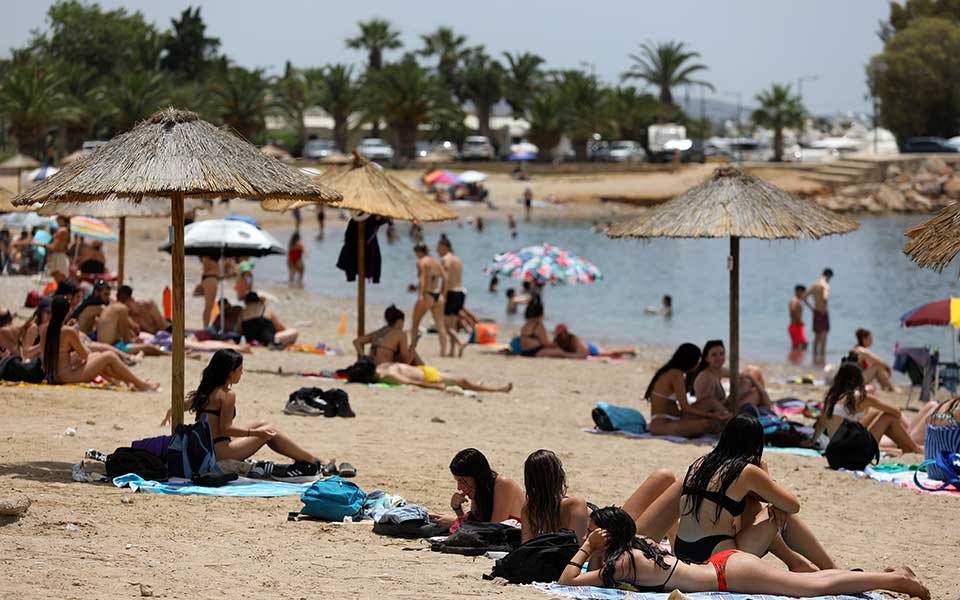In 1916, central and southern Greece experienced what was the hottest day for that region up to that point in modern times. In Athens, on June 21, 1916, the thermometer soared to 43°C, setting a record that would stand for nearly a century. This record was finally broken on June 26, 2007, when the Thiseio meteorological station, in the heart of the Greek capital, recorded a staggering 44.8°C, the highest Athens temperature since reliable measurements began in the late 19th century.
Heatwaves are not rare in the southeastern Mediterranean, but in Greece, they traditionally occur in July and August. Until recently, June heatwaves were considered particularly unusual. Not anymore. Since 2007, June heatwaves have become more frequent (2016, 2017, 2021, 2024) and earlier dates were notable, too; on May 16 and 17, 2020, temperatures reached 37°C. But this year, what happened in the country was exceptional: not only did the heatwave arrive earlier than ever, but the days with significantly higher-than-average temperatures spanned almost the entire month. It was unprecedented and, unfortunately, July followed a similar pattern.

© AP Photo / Petros Giannakouris
In a broader context, the statistics from the past year are much more than a warning sign. They provide a comprehensive understanding of the historical context of climate change, which is emerging as a significant threat to Athens, its economy and its tourism industry. The data is revealing: 2023 was the hottest year ever recorded in Athens, according to the historical climate archive of the National Observatory of Athens (NOA) that goes back to the mid-19th century. With an average temperature of 19.8°C, 2023 in Athens was 2.3°C warmer than in the pre-industrial period (1860-1900) and 1.3°C warmer than the average annual temperature of the most recent climate period, 1991-2020.
Additionally, the decade from 2014 to 2023 was 1.7°C warmer than the average temperature of the period from 1860 to 1900 in Athens. Athens experienced the warmest winter (December 2023-February 2024) in at least the last 160 years, again according to the NOA climate archive, with an average temperature of 13.0°C, an average maximum of 16.7°C and an average minimum (nighttime) temperature of 10.3°C. High temperatures during the winter 2023-2024 were reached during all the months, but December 2023 and February 2024 were particularly warm. The recent winters of 2020-2021 and 2015-2016 were also among the warmest ever, but it’s worth noting the unusually warm winter of 1935-1936, too, which highlights the role of natural factors in climate variability as well.

© ANA / MPA / ALEXANDROS BELTE
The Athenian tourism industry is facing the situation with remarkable calm and resilience. Despite the challenges posed by climate change, there are no signs of a slowdown in the wave of interest in the city. The first five months of 2024 ended for Athens hotels with an average occupancy rate of 72.3%, compared to 68.9% in 2023, while arrivals at Athens International Airport are continually setting new records.
Although environmentalists have been sounding the alarm for years, few imagined that the first generations of the 21st century would feel climate change firsthand and to this extent. “It’s one thing for a given summer to be hotter than usual, and another for temperatures to gradually rise over a succession of hot summers, potentially leading to a change in the established habits that shape the planning of an entire year,” says Elias Kikilias, general director of the Institute of the Greek Tourism Confederation (INSETE), who speaks plainly about “adjusting the season” in the long term if the climatic conditions of this and last summer persist. Have we reached that point? “Not yet, thankfully,” says Kikilias. “However, if a certain perception about the Mediterranean summer gains traction in important international markets, we may witness shifts that will disrupt the underlying ‘doctrines’ of both the Greek and Athenian tourism economies.” One of these doctrines is that the most “productive” months for Athens have traditionally been June and July. Why shouldn’t this change? Why not shift to previously low-tourism periods, such as December and January? However, making such a drastic change is not easy. For one things, schools still close throughout the summer months.

© ANA / MPA / JOHN KOLESIDIS
Increased Activity
Speaking with hotel sector stakeholders, there appears to be both concern and optimism. Athenian hotels are expecting to have the best season in the city’s tourism history. “It is a shame they can’t enjoy it as much as they’d like,” says an experienced hotelier. “When the thermometer remains at 36 or 37°C for days, elderly visitors in particular are essentially excluded from numerous activities from noon to late afternoon, which is normally the most ‘productive’ part of their day.
Furthermore, the heat has a greater influence on city tourism, particularly among older travelers, who typically spend more.” Athens hotel occupancy rates averaged 72.3% in the first five months of 2024, up from 68.9% in 2023. However, if there is a slight flaw in this positive picture, it is that while May this year had a higher occupancy rate than the preceding months (86.2%), it showed a -2.7% decrease compared to May 2023.

© Intime News
Unceasing Heat
“We are experiencing a climatically extreme summer for our region,” says Kostas Lagouvardos, head of NOA, noting that we just had the warmest winter on record. “With the exception of May, we’ve had 12 consecutive months of slightly or significantly above-normal temperatures since July 2023. June was extremely hot, and July appears to be following the same trend, with all of our data showing prolonged heat ahead.”
He points out that the issue for Athens and all tourist destinations is not so much the heat itself, but its duration. “In June, we only exceeded 40°C for one day. The problem was that temperatures were significantly higher than average on practically every other day of the month, exacerbating the sensation of heat. It is the duration that becomes tiresome and exhausting for people.” Although Athens and Attica have always had hot summers, their climate, due to the north-northeastern breezes (the well-known meltemia), has been relatively more bearable than in locations that do not benefit from the north wind and lower humidity.
“This is particularly true for the northern suburbs and the eastern coastal areas, but not so much for the city center or the southern parts,” continues Lagouvardos, “where the temperature doesn’t drop sufficiently, even at night. Let’s assume that a visitor can tolerate the daytime heat but hopes for relief at night, and then that relief fails to materialize since the temperature remains around 31 to 32°C at midnight; their sense of discomfort grows even more acute.”












